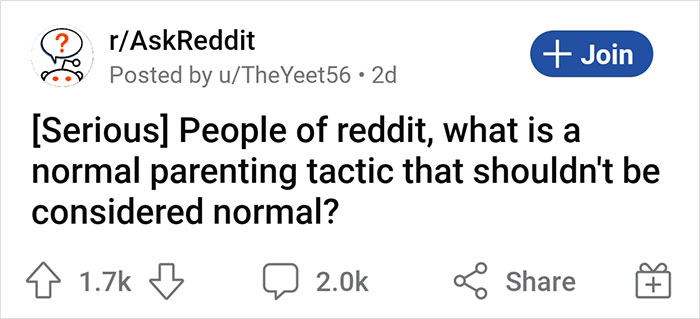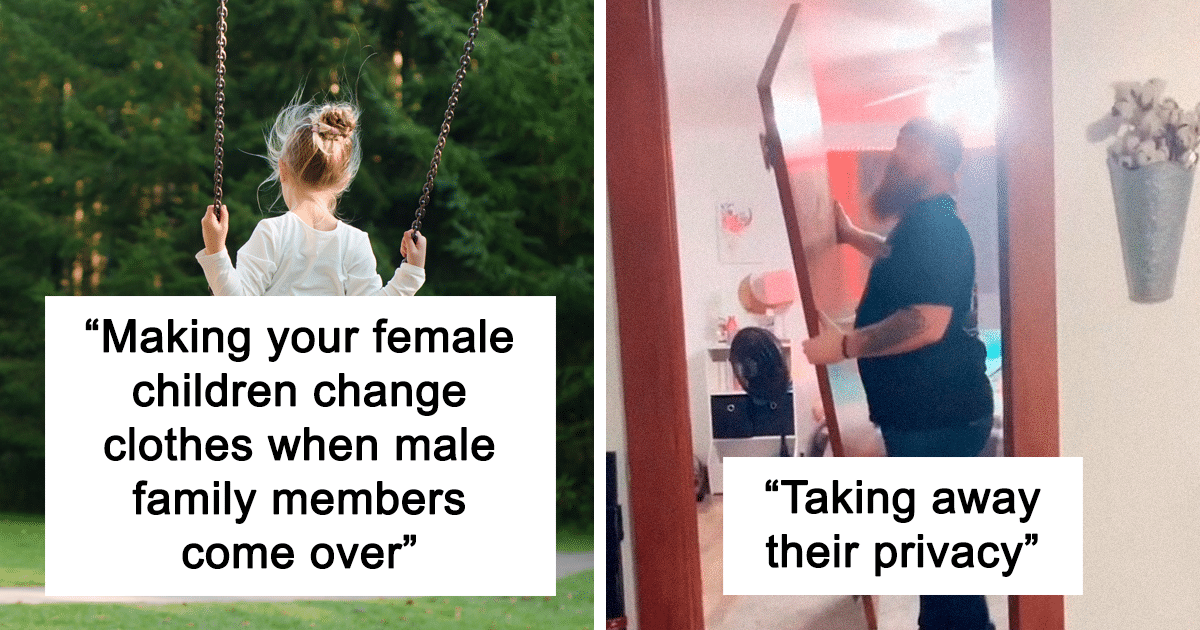A thread on r/AskReddit asked people to call out toxic parenting tactics that are still viewed as normal. Scroll down to see the response.

1.
Refusing to apologize when you’re wrong.
Apologize to your children when you’re wrong. Admit you don’t know something when asked. Change your mind when your child gives you a valid reason. I grew up in an authoritarian household. … It only teaches kids they have no voice.
2.
Saying that a kid has a boyfriend/girlfriend any time they are close friends with a child who isn’t the same gender. On top of reinforcing the idea that boys and girls can’t ever be strictly platonic friends, it’s so creepy to project adult ideas of romantic relationships onto kids who are practically still toddlers.
3.
Telling your kids your personal problems. Like, ‘Your dad is horrible; he didn’t even do the dishes. I hate my marriage.’ Your kids are not your therapist. Also, they can’t do anything to solve your problem. Instead, address your issues with your spouse and a therapist.
4.
‘You can tell me, and I won’t be mad’ followed by punishing them for whatever they admit. Then they wonder why their kids never talk to them.
5.
Being overly protective. If you don’t let your kids fail or protect them too much, they’ll be less capable of doing so once they’ve left home. Failure is good; just provide a safety net.
6.
Getting mad for ‘disrespect’ or ‘talking back’ when their kids win an argument.
7.
Using humiliation and embarrassment as a punishment.
8.
Taking away their privacy. Unless your kid has a serious drug or self-harm problem, violating their privacy will almost certainly do more harm than good to their mental health, trust, and their relationship to you. It doesn’t matter if it’s installing spyware on their phones, tracking their movements, or taking away their bedroom door.
9.
Telling little boys that they cant defend themselves against a girl who is hitting them just because they’re a girl. That’s bs, I was taught to fight back no matter who attacks you. There’s no gender in mutual combat.
10.
Invalidating their kids’ emotions, be it ignoring or shutting them down.
11.
Making a child eat everything on their plate if they say they aren’t hungry anymore. Do you want you kid to have an eating disorder? No, then don’t because that’s how you can cause one.
12.
Forced affection.
This is controversial (especially here in America) but I feel like we say “I love you” way too much to the point it loses its meaning. My dad (who was extremely emotionally abusive) used to force me to say the words “I love you daddy” to him, in private and in front of other people. By nature, I have never been an affectionate person, especially in front of others. I don’t like to hug and kiss a lot.
I also don’t believe in making children hug people. If the child wants to hug them, they will. It shouldn’t be forced.
13.
Comparing them to their siblings. The good old, ‘Why can’t you be more like your brother/sister?’ does nothing for their self-esteem and really can keep them from becoming their own person. That’s all they should be anyway — themselves, not their siblings.
14.
The old “as long as I’m feeding you, clothing you, you’ll do what I say!” Or the “just be grateful I put a roof over your head”.
Especially If your parents constantly use that sentence to boss you around, disregard your opinions and wants, and belittle you. You didn’t ask to be born. And it’s their obligation to take care of you, not something they should loom over your head as leverage.
15.
I’m not sure if this is “normal” or just something I see online.. but mums pulling the “just wait till dad gets home” card. Why would you want your kids to be afraid of their dad? And why should the dad have to play bad cop all the time? The last thing I want is my partner coming home from work and yelling at the kids for me.
16.
Overly accommodating and praising children.
My sister always excelled in academics and was also an accomplished pianist in high school. My parents didn’t make her do any of the chores I had to in order to ‘preserve her hands for piano.’ Her excellence at school, in clubs, and with piano also kind of led to her being constantly praised by people around her. Now, in her mid-twenties, she lacks basic life skills (cooking, cleaning, and even self-cleaning) and is unable to take any criticism, no matter how small.
17.
Not explaining their decisions. Like, ‘You have to do this because I’m your mom/dad, and I say so. End of discussion!’ Instead, you can bring your kids on board with sooo many of the decisions you make for them if you take the time to explain your reasoning to them. Kids understand more than a lot of parents think — just give them a chance.
18.
Make your female children change clothes when male family members come over.
19.
Taking away things that the child has earned for themselves. If your kid is old enough to work and use that money to purchase something for themselves then it’s theirs and you have no right to take it. I don’t care if it’s a car or a PlayStation 5.
Same thing with the money itself. Just because your kid is old enough to work and bring home a paycheck doesn’t mean you’re entitled to that money. I personally had to open up a brand new bank account the day I turned 18 because my mother helped herself to over $700 of my money. When I confronted her she basically told me “[screw] you I’m the adult on the account so it’s my money too!”
20.
Forcing your children to give family members that make them uncomfortable, hugs and kisses. Additionally inviting family who actively distress your kid to your house to stay for an extended period and forcing the kid to be nice and interact.
21.
Giving in when your child is being difficult. It teaches them all they have to do to get what they want is throw a fit. You’re encouraging more difficult behavior.
The correct way to handle it is to sit in whatever storm they whip up. Stay calm and hold the boundary.
22.
Invalidating their emotions just bc they’re children, Cruel jokes ab their physical appearance or behavior.
23.
Saying anything along the lines of ‘just be happy.’ Like thanks, my depression is cured — especially since depression runs in my family on both sides.
24.
Gaslighting their children into believing things that are simply not true in order to defend themselves.
25.
Being overly involved in your child’s life. I’m talking about relationships. Your child should have their own relationships without the parent acting as the third wheel and seeking validation from the friends or partner too. Being involved is a good thing, but when you are so invested in their relationships too it can be damaging to your kid and their future relationships.
26.
Letting one sibling bully another and turning a blind eye, with the philosophy that they should work everything out for themselves. Punishing both siblings equally when one is 3 years older, much larger, much stronger, much more verbally sophisticated, and adept at manipulation, and when the younger one complains, shutting them up by saying, “Well, did he put a gun to your head?”
That’s how you teach a kid to be a victim.
27.
Not necessarily personal experience, but I do think it’s absurd how often parents will speak of their own child as “spoiled” for having all kinds of nice possessions like video game systems, cell phones, cars as if that wasn’t entirely the parent’s choice. If you don’t think your kid should have those things for free, then don’t buy them for the kid. Don’t shower gifts on your child and then act like the child is a bad person for owning them.
People have this obnoxious reactionary/conservative tendency to speak automatically about kids as if they’re brats who don’t appreciate the nice things they have. People look at a place full of 13-year-olds with expensive phones in their pockets and act like it’s the downfall of society. It’s just assumed, based on nothing, that all those 13-year-olds must be ungrateful and entitled and believe they automatically deserve an expensive phone.
28.
Listening solely to other parents for advice. My mom listened to my grandmother instead of taking me to a psychiatrist. It wasn’t “a phase” it was autism and OCD. Now I’m in my 20s with trauma from the way my mental health was disregarded and autism leaving me more vulnerable to abuse. I’m left to navigate by myself.
29.
Threatening to take away things and 50% of the time never actually doing it. This leads kids to live in a state of being unsure of what will happen. Take the thing away or don’t.
30.
Having kids before you’ve gone to therapy to address your own childhood trauma, as this just causes undue trauma on the kids.









